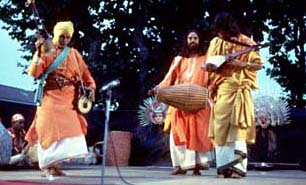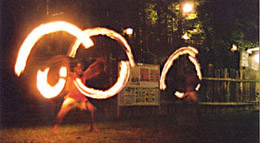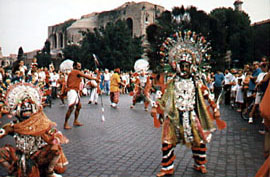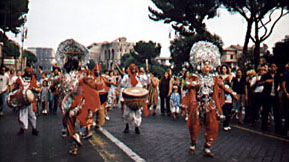Milón Méla
After having participated in
the group of Theater of Sources directed by Jerzy Grotowski, Abani
Biswas has continued to work in India.
His research team has gradually expanded, as a number of traditional artists
representing diverse disciplines and regions of India were invited to
join in the workshops.
Over a period of several years the performing activity of Milón
Méla has evolved into a stable part of the Source’s Research
project. Today 15 to 20 traditional artists participate in residential
workshops in India and in Italy, and in annual tours
in Europe.
The group of Milón Méla includes:
-
Baul musicians
-
Chhau dancers
-
Kalaripayattu martial art masters
-
Gotipua dancers
-
members of the Source’s Research team.
Milón Méla was presented at theater festivals in Italy,
Switzerland, Poland, Germany, Slovenia, Spain, France and Austria.
It has been performing in city squares and streets, open arenas and theaters.
The group conducted workshops in schools and universities, worked with
various theatre groups, cultural associations, psychotherapy groups and
people from different walks of life interested in our work.
European Tour |
|
|
|
|
Performances
Each group of traditional artists presents with a due mastery their own discipline:
- Songs, music and dances of the Bauls of Bengal (string instruments, percussions and cymbals)
- Salutations and combats (sticks, swords and shields, knives etc.) of Kalripayattu. During the outdoors performances the Fire Dance is included in the program
- Chhau dances with magnificent masks, acrobatic exploits and a rich selection of stories from Purana, Mahabharattha and Ramayana. Nagra and Dhol drums, Shenai windpipe and cymbals accompany dancers.
- Gotipua Dance from Orissa, the soft harmony of the mudras and acrobatic movements combined with vocal and instrumental accompaniment (Pakuaj percussions and Harmonium keyboards) characterize this classical enchanting dance.
Show time: 1h 15 minutes without an interval.
Technical requirements:
- For indoor performances (theatre stage or a large hall) a possibility of a complete blackout is required.
- Space dimensions: 8x7 meters.
- For a theatre stage black background and side curtains are needed.
- Lights: 20 adjustable revolving lights, 5 floor-lights, 4 spots with yellow and orange gel
- Sound: 6 lavalier radio-microphones,
4 directional microphones with perches
(If the room has good acoustics it is preferable to use natural sound without any amplification).
 |
Requirements for outdoor performances (squares, loggias, parks, amphitheatres etc.) vary; therefore it is important that the group director visits the location few days before the actual performance. |
Parades
Dynamic and filled with energy, the Parade catches attention of
grown-ups and children alike.
It communicates with and invites to participate spectators and bystanders.
The Parade begins with a dramatic entrance of drums followed by
the vibrant tune of Shanai pipe that sets off the Parade on its
route.
The group is lead by Baul musicians who are followed by the refined and harmonious Gotipua dancers, by the masked Chhau
with their acrobatic dances and by Kalaripayattu combats combined
with whirling fireworks.
Along the way the group stops in larger squares where it offers additional
presentations.
Ideally, the Parade should start at sunset and evolve into the
night illuminated by the lights of the Fire Dance.
|
|
|
3-day programme
| 9:30 –
13:00 Space requirements: Big hall with a possibility of complete blackout and preferably with a wooden floor. |
Workshop
At the end of the workshop the presentation and the Mother Language with the involvement of 4-6 workshop participants are presented to a limited public. |
| 17:00 - 19:00 The set up, if possible, can be arranged in the workshop space. |
Exhibit of Patua scrolls accompanied by music and songs of Bauls. |
| 20:00 - 22:30 | Alternating theatre events: Parade, Performances, demonstrations and The Mother Language |
| The group can be lodged at social/cultural centers, schools, countryside tourist establishments etc. If the premises are adequately furnished the group can take charge of running its own kitchen. |
 |
|
milón
méla
|


